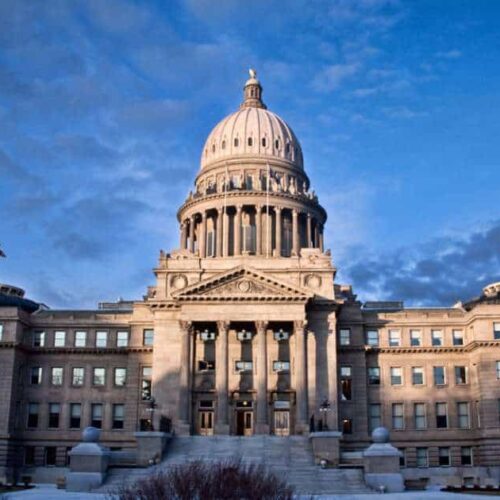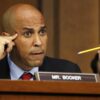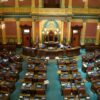Introduction
In 2018, we continued to dive into Conflicted Interests, our in-depth investigation with the Associated Press into legislators’ conflicts of interests in statehouses across the U.S.
We also jumped into new investigations: how pharmaceutical companies influence state Medicaid boards, a look at out-of-state influence on elections and a move to change the Constitution.
Our top state politics stories of 2018:
How drugmakers sway states to profit off Medicaid

Around the country, drug companies are working to undermine state Medicaid drug cost controls to keep their profits flowing while the cost of Medicaid is ballooning.
Medicaid already accounts for more than a quarter of 26 states’ budgets, pitting the costs of classrooms, roads and public defenders against paying for health care. And prescription drugs are helping drive the increasing expense nationwide. From 2008 through 2016, Medicaid drug costs grew almost 50 percent per patient, helping to nearly double the program’s drug spending to $31 billion.
A Center for Public Integrity and NPR investigation found pharmaceutical companies have infiltrated nearly every part of the process that determines how their drugs will be covered by taxpayers: giving free dinners and consulting gigs to many doctors on the obscure committees advising state Medicaid programs; asking speakers who don’t disclose their financial ties with drug companies to testify about their drugs; and paying for state Medicaid officials to attend all-inclusive conferences where they can mingle with drug representatives.
Beyond that, drugmakers use other tactics to get their products paid for by the Medicaid programs: lobbying state lawmakers to achieve their goals or helping doctors fill out extra paperwork to get Medicaid to pay for the costlier drugs. The result is that Medicaid sometimes spends more than necessary and may pay for medicines inappropriate for patients.
How a mock convention is helping fuel a movement to change the constitution

Amid historic re-enactors wearing tricorn hats and carrying muskets, more than 120 state legislators from all over the country pretended to overhaul the U.S. Constitution two years ago in Colonial Williamsburg, Virginia.
But some believe the event was not just a history lesson. Critics say the Williamsburg get-together may have been a dress rehearsal for the real thing, and the implications of that could be both explosive and far-reaching.
Since attending the mock constitutional convention, legislators in at least 27 states have proposed bills calling for an actual convention of states, a Center for Public Integrity review has found. Attendees from five states — Arizona, Illinois, Missouri, North Dakota and Texas — have already successfully passed legislation. And today, similar bills are pending in North Carolina, Pennsylvania, Ohio and New Jersey. There’s still a long way to go — but the prospect of a real constitutional convention no longer seems like just an abstraction.
An uncertain future for America’s wind energy capital

About 2,200 wind turbines were built in Texas in 2017, more than ever before, as wind industry companies try to snag billions of dollars in federal tax subsidies before they expire at the end of 2019. This has set off a wind rush nationwide, but it’s also set up a fight at the state level to regulate this overlooked industry without clipping its wings.
The rush is forcing state officials across the country to question if energy consumers are footing the bill without getting enough benefit from the projects — and to ask what happens to the more than 57,000 wind turbines nationwide after they stop producing energy?
Nowhere is this fight and uncertainty more palpable than in Texas, the wild west of wind energy and the home of the nation’s wind energy capital, Sweetwater, where the surrounding county boasts one wind turbine for every 12 residents.
Turkey’s propaganda war targets America’s state capitals

A law firm hired by the government of Turkey is lobbying state officials across the U.S. about what it alleges is a suspicious network of American charter schools run by a dangerous Turkish opposition leader.
Federal records show Turkey’s lawyers requested meetings in January 2018 with politicians in 26 states and the District of Columbia, including attorneys general, influential legislators and at least one governor — Michigan’s Rick Snyder.
The legal team has already sat down with an official in the Arizona attorney general’s office, worked on legislation in Texas and attended school board meetings in California, Louisiana and Massachusetts.
It’s the latest move in a curious propaganda war playing out in America’s state capitals between Turkey’s ruling party and a secretive religious movement that the Center for Public Integrity previously revealed has funded scores of international trips for state lawmakers from places such as Texas and Tennessee.
The NBA and MLB quietly hustle for a cut of the sports betting jackpot

As legalized sports betting opens up to more states, the MLB and the NBA have been pressing for “integrity fees” of up to 1 percent of all bets placed on games — purportedly for policing against game-fixing — and drafted what’s known as model legislation to help get the fees codified into law in each state. To make their case, they have been bankrolling more than 80 lobbyists in more than a dozen statehouses and dispatching top officials across the country — from Kansas to New York — to testify in legislative hearings.
All this is part of an influence game that pits the leagues against a host of other special interest groups — including the gambling industry, college athletic programs, players’ unions and even service providers for gambling addicts — while Congress ponders whether to wade into the legal thicket and come up with a new federal framework to regulate sports betting.
How billionaires from other states are shaping this year’s ballot measures

Twenty-five American billionaires invested more than $70 million for ballot initiative campaigns this year in 19 states where they do not reside, according to a Center for Public Integrity analysis of state records — part of our Local Voters, Distant Donors series.
That was more than 10 percent of the $648 million disclosed by mid-October for statewide ballot measure campaigns, as tracked by the nonpartisan political encyclopedia Ballotpedia. And the total is likely an undercount of billionaires’ influence on this year’s ballot measures. It doesn’t include gifts from billionaire-led corporations, nor from nonprofits where the billionaires are among a multitude of backers, nor from nonprofits whose donors’ identities are unknown.
The handouts from the wealthy to campaigns across state lines rankle some local opponents, even though no one questions their legality. Just who should decide issues in their states, they ask — the people who live there or some rich folks from out-of-state?
Out-of-state donors pour cash into Democrats’ state races
Nationwide many Democrats running for state-level offices from governor to state representative hauled in a significant amount of donations from across state lines, according to a Center for Public Integrity analysis of campaign finance data collected by the National Institute on Money in Politics.
Though Democrats trailed Republicans in the overall fundraising tally, they raised at least $101 million from out of state — about $29 million more than their GOP counterparts had taken in by mid-October — as part of the newly energized “blue wave.” That’s a far cry from the 2014 elections, when Republicans ended up outraising Democrats by almost $9 million in out-of-state contributions and by $191 million overall.
A #MeToo Candidate is loved from afar, but faces a different kind of resistance at home

Political newcomer and firebrand Katie Muth ran in this year’s elections to unseat a Republican incumbent in Pennsylvania’s 44th state Senate District covering the western suburbs of Philadelphia. She was part of the left’s surge of women candidates furious about the 2016 election who poured their rage into the midterms.
Support for candidates like Muth came from all over the country. After a decade of Democratic losses at the state level that left the GOP with majorities in 67 out of 99 legislative chambers, and with many statehouses due to redraw congressional districts after 2020, liberal activists banded together in an aggressive effort to flip state seats from red to blue.
But back home, Muth said ahead of the election, the established political apparatus wasn’t embracing her candidacy. The way she saw it, the mostly male leadership of the Pennsylvania Democratic Party was more bent on protecting its current lineup than expanding the bench — especially to include someone like Muth who’s become a brutally frank voice amid the party’s own #MeToo reckoning.
How cryptocurrency is sneaking into state elections

Democrat Brian Forde raised nearly half a million dollars of bitcoin for his unsuccessful bid for a California congressional seat this year, but then had to field questions from election watchdogs about a contribution from Hong Kong.
Republican Austin Petersen, a U.S. Senate candidate from Missouri, received the largest single bitcoin donation in federal election history, but was forced to return the virtual currency in June because it exceeded federal contribution limits.
In an era of Russian hackers, super PACs and shell corporations being used by foreign entities to influence voting, officials tasked with maintaining the integrity of state and local elections had one more thing to worry about: crypto-candidates.
The Center for Public Integrity found 20 crypto-candidates of various political stripes, seeking all levels of office, who requested or received cryptocurrency to fund their efforts. At least three were candidates in a state that has since banned such donations. Another was accepting currency marketed as untraceable. The confusion over campaign cryptocurrency is widespread, and the implications are far from isolated. But the effort to establish uniform rules is lagging behind.
Michigan lawmakers voted on bills even after admitting conflicts of interest

Republican state Sen. Darwin Booher of Michigan initially abstained from voting on a 2015 bill that proposed a $12,000 raise for circuit court judges, writing that it “could be perceived as providing a benefit to an individual to whom I am personally related” — his daughter, 49th Circuit Judge Kimberly Booher.
But a year later, the senator did vote on the raises when a House version came back to the Senate. The bill passed and became law, giving his daughter and her peers a salary boost.
Booher is not the only Michigan lawmaker who voted on bills that could potentially benefit them or their close relatives. A Center for Public Integrity analysis of more than 50,000 pages of official legislative journals logging each day’s actions found six other Michigan legislators who voted on bills even when they publicly noted their own conflicts of interest.
These state lawmakers are running unopposed, but still rake in campaign cash

At least 26 legislative leaders in statehouses across America raked in cash despite running unopposed this year, according to a Center for Public Integrity analysis of National Institute on Money in Politics data. Two of those power brokers raised more than $2 million apiece.
The safe legislators represent an attractive prospect for statehouse lobbyists and power-seekers: the sure bet. Contributions to these influential politicians can buy face time and favor with those who set state legislative agendas, experts say. The money also compounds their power: Legislative leaders use their pots of gold to buy presents to thank supporters, for example, or give to fellow lawmakers’ campaigns to reward them for voting with their party.
So what exactly do the unopposed politicians do with all that cash? While some has gone to help out allies’ campaigns or purchase normal political kitsch — such as buttons and bumper stickers — a few legislative leaders spent their war chests on more than $513,000 in sports tickets for supporters, more than $24,000 for country club golf outings and even $25,000 to a family member’s accounting firm.
Read more in Money and Democracy
Money and Democracy
What second-quarter fundraising can tell us about 2020
Presidential campaign finance disclosures help gauge candidate viability and voter enthusiasm.
Money and Democracy
Supreme Court punts on partisan gerrymandering, sets up fight in the states
State courts, state legislatures and voter ballot initiatives are primed to become the main battlegrounds for partisan map drawing, as federal courts remove themselves from the debate.







Join the conversation
Show Comments